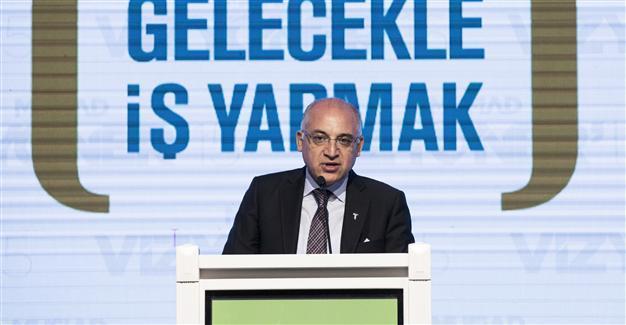Turkish exports decline more than 10 pct due to parity, geopolitical risks
NİĞDE

TİM President Mehmet Büyükekşi. AA Photo
Turkey’s exports declined by 10.5 percent in November to $11.44 billion year on year amid dramatic fluctuations in euro-dollar parity and geopolitical risks, according to temporary data revealed by the Exporters’ Assembly of Turkey (TİM) on Dec. 1.The country’s exports declined by 8.6 percent to around $132 billion in the first 11 months of the year compared to the same period of the previous year, according to the TİM data.
“The negative effect of the euro-dollar parity was around $750 million over exports in November and $11.9 billion in the first 11 months of the year despite the rise in exports on an amount basis,” said TİM President Mehmet Büyükekşi at a press meeting in the Central Anatolian province of Niğde.
Turkey’s 12-month exports saw a decrease of around 7.8 percent to $145.2 billion, according to a follow-up press release from the association.
The largest amount of exports was made by the automotive sector in November at around $1.92 billion in November, followed by the ready-made clothing sector and the chemical materials sector, both of which, however, saw a 6.3 percent decrease and 12.8 percent decrease, respectively, in November compared to the same month of 2014.
While Turkey’s exports to Africa increased by 0.7 percent in November year on year, its exports to the European Union regressed by 0.9 percent, to North America by 11.2 percent and to the Middle East by 19 percent, according to TİM’s data.
The expanded stimulus program that the European Central Bank is expected to announce this week will enable Turkish exporters to increase their trade with the EU, as it will help the EU economy recover faster, said Büyükekşi.
“Turkey is also in talks with the European Commission about upgrading the customs union agreement. This will also help Turkish exporters in the future,” he added.
‘No need to mix politics with trade’
Regarding the current diplomatic crisis with Russia and its potential effects on Turkish-Russian trade, Büyükekşi said Russia should not mix trade with politics.
“Trade and politics should be independent. Politics can recover quickly, as early as tomorrow, but trade ties cannot recover in one day,” he said.
He also noted that there had been a general decline in the two countries’ trade due to economic problems in Russia.
“Our textile, chemical product, automotive and leather exports to Russia have already declined by around 50 percent, mainly due to the oil slump and the current problems between Russia and Ukraine. Our exports to Russia declined by 38 percent to $3.5 billion in the first 11 months of the year compared to the same period of 2014,” he added.
Büyükekşi said exporters expected the new cabinet to prepare a new constitution that will guarantee the rule of law and independent law and the design of an export-based growth model.
“We want the new cabinet to maintain the accession process to the EU, revive the peace process, continue the fight against the informal economy and [provide] subsidies to the innovative economy,” he added.
















